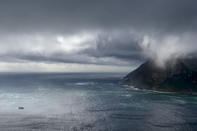The Caretakers
Despite their successful occupation of the Cape, the British considered themselves as nothing more than caretakers. English imperialism was still incipient, and the British already had a trading post on the little island of St. Helena in the mid-Atlantic, which gave their ships secure access to the East.

However, South Africa just didn’t seem worth the effort, and there were many politicians back in Britain who felt that there was no profit to be had in the troublesome Cape Colony. So, when the diplomats patched together a rough European peace in 1802, the British went along with the Treaty of Amiens and handed the Cape back to the new masters of Holland.
The Batavian Republic also officially took control of all the VOC’s remaining assets and foreign territories, and folded them into the national treasury. The once great Dutch East India Company had ceased to be.
Peace Did Not Last Long
However, peace between Britain and France did not last long. About six months after the new Batavian administrators arrived at the Cape, Napoleon and John Bull were at loggerheads again. Britain did not want to give up Malta, and the French army didn’t want to withdraw from the Lowlands of Holland and Belgium. As the Batavian Republic was now a definite ally of France, it was obliged to join in the fun.
The new administrators at the Cape, meanwhile, had many ambitious plans for the colony, but they had barely cleared their throats before political uncertainty in Europe put paid to their efforts. At first, the new war between France and England was fought on the seas in the Mediterranean and in the Atlantic, leaving the Cape relatively untouched.
However, intelligence soon reached the Admiralty in Britain that Napoleon intended occupying the Cape. Once again fearful that Frenchy would take control of the strategically important port in Table Bay, the British became offensive. The days of Batavian rule at the Cape were numbered.